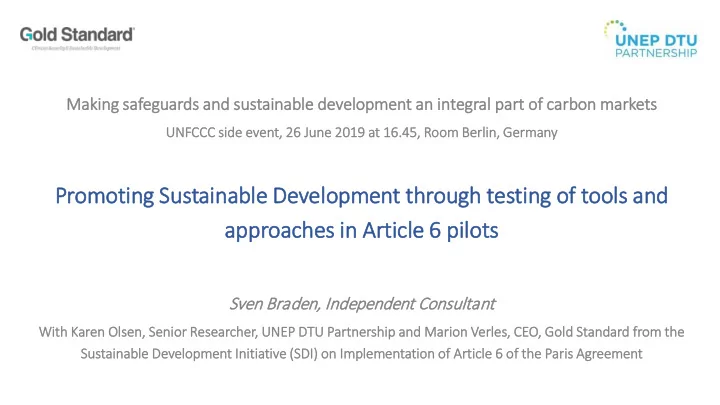

Making s safegu eguards and s sustainable d e dev evel elopmen ent a t an integr tegral p part o of c carbon m markets ts UNFCCC s side de e event, 2 26 June une 2019 at 16.45, R Room B Berlin, Germany Promoting S Sustainable D Development t through t testing of t tools a and approaches i in Articl cle 6 6 pilots Sven B Braden, I Independent C Consulta tant With h Karen n Olsen, n, Seni nior R Researcher, , UNEP D DTU P Partnershi hip a and M nd Marion V Verle les, CEO, G Gold S Standard d from the he Sus ustaina inable le D Develo lopment I Ini nitia iativ ive ( (SDI) I) on n Imple plementatio ion of Article 6 6 of the he Paris Agreement
Outline 1. Introduction • Sustainable Development Initiative (SDI) workprogram • SDI text proposals for COP25 2. Piloting of SD tools and approaches • SD approaches assessment grid • ETS linking case study 3. Partnerships for testing SD tools and approaches in Article 6 pilots 2
SDI workplan 3
GOAL: PROMOTE IMPLEMENTATION OF STRONG SD PROVISIONS IN ARTICLE 6 OF THE PA Roundtable discussions WS 1 - Party Driven Article 6 text recommendations Dialogue Knowledge sharing from testing & piloting (WS 2) WS 2 - Piloting Testing of SD approaches of SD approaches Production of case studies and knowledge products WS 3 - Dissemination of knowledge at relevant industry events Outreach to relevant carbon market Partnerships building and regional groups to raise awareness players 4
SDI text proposal for COP25 Article 6.2 – Focus on reporting: Ex-ante assessment and reporting of expected SD contributions of the collaboration; Periodic ex-post assessment and reporting of the SD contributions; Development of tools and approaches adapted to various types of collaboration (project level, sectoral level, policy level) for voluntary use to: • Support SD assessment and reporting towards nationally determined goals and priorities of host Parties; • Avoid/mitigate negative impacts. 5
SDI DI text p propos osals, Art. 6 6.4 ( (Focu cus o on r roles a and r responsibilities) ) Participation requirements for host Parties: The confirmation of the host Party based on information made publicly available that the activity fosters sustainable development; Facilitative role of the Supervisory Body mandated to: Foster knowledge exchange and support development of tools and approaches (for voluntary use ) to facilitate SD assessment and reporting (ex- post, ex-ante) towards nationally determined goals and priorities of host Parties; Enable the development of nationally determined approaches for stakeholder consultations on sustainable development, a grievance mechanism and do-no-harm safeguards informed by international best practice. 6
Piloting of SD tools and approaches 7
Objectives of piloting • To demonstrate through real life cases, that SD assessment can be implemented in a robust, yet practical manner and delivers multiple benefits to all players involved • Piloting under workstream 2 supports text proposals (workstream 1) • Promoting SD will deliver enhanced SD impact assessment ambition for climate action 8
SD Assessment Grid • Rationale: • Provide a simple grid to identify a SD approach suited to the needs of users • Allow for the benchmarking of SD tools, create the conditions for convergence and alignment around SD best practices • Structure of the grid • It builds on the 6 high level options identified by the SD initiative in 2018 • It provides a set of requirements to assess selected SD approaches (Yes / No) • SD Approaches tested • Gold Standard for the Global Goals ’SDG Impact Tools’ • UNDP SDG tool • CDM SD tool • ICAT Sustainable Development Methodology 9
SD Assessment Grid overview Criteria Summary of Main Requirements Governance National Prerogative Accessibility Decision making Baseline Verification Transparency Safeguards Generic requirements Specific safeguards (corruption, human rights etc) Activity specific safeguards Stakeholder inclusivity Opportunity for Stakeholders to engage Grievance / complaints mechanism SD Impact Assessment Intervention design principles Impact assessment approach MRV and Claims Management Ex-ante / ex-post Claims guidance and management Verification New ETF relevance Availability of data as required under ETF 10
SD Approaches Assessment – next steps • Formulate recommendations to users on the basis of: • Intervention level (project / program / policy / sectoral / national) • Needs and expectations from SD perspective • Costs / benefits analysis • Expand the list of SD approaches tested • Final report due end of July 11
ETS linking case-study • Objectives: • Assess the relevance of SD requirements in a linking context • Provide recommendations on how to strengthen SD provisions in future Linking Arrangements • Analyse the extent to which current Linking Arrangements integrate SD requirements 12
ETS linking – SD recommendations • Preliminary results (in the context of Article 6.2): • Accountability of MO – implications for SD accounting • Recommendation that ‘double claiming’ in the context of SD benefits is not an issue of practical relevance, support credible MRV and transparent reporting as per Article 13 para 77 d • Recommendations on how to deliver on Article 6 obligation to promote SD: • Safeguarding principles adapted to address specific risks of ETS linking • Identification of typical SD benefits expected from linking + proposed indicators and monitoring approaches • Benefits associated with SD provisions in Linking Arrangements • Supporting National SD priorities (e.g. environmental and social co-benefits) • Serving Article 6 mandate • Public acceptance 13
Thanks! The Sustainable Development Initiative is a joint collaboration of the UNEP DTU Partnership and the Gold Standard Foundation supported by Belgium, Finland, Germany, Norway, Sweden in 2019 Karen Holm Olsen, UNEP DTU Partnership, kaol@dtu.dk Sven Braden, Consultant, braden@climatefoundation.li Marion Verles, Gold Standard Foundation, marion.verles@goldstandard.org
Recommend
More recommend